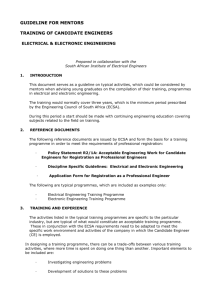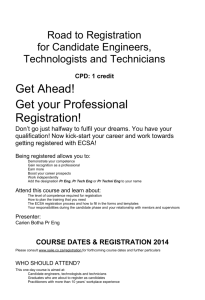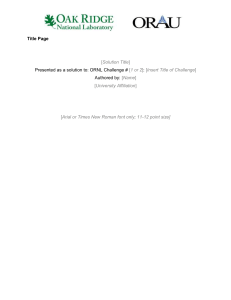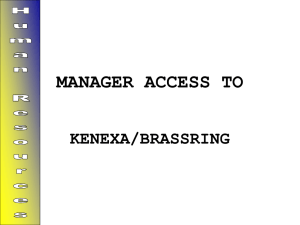Industrial Engineering
advertisement
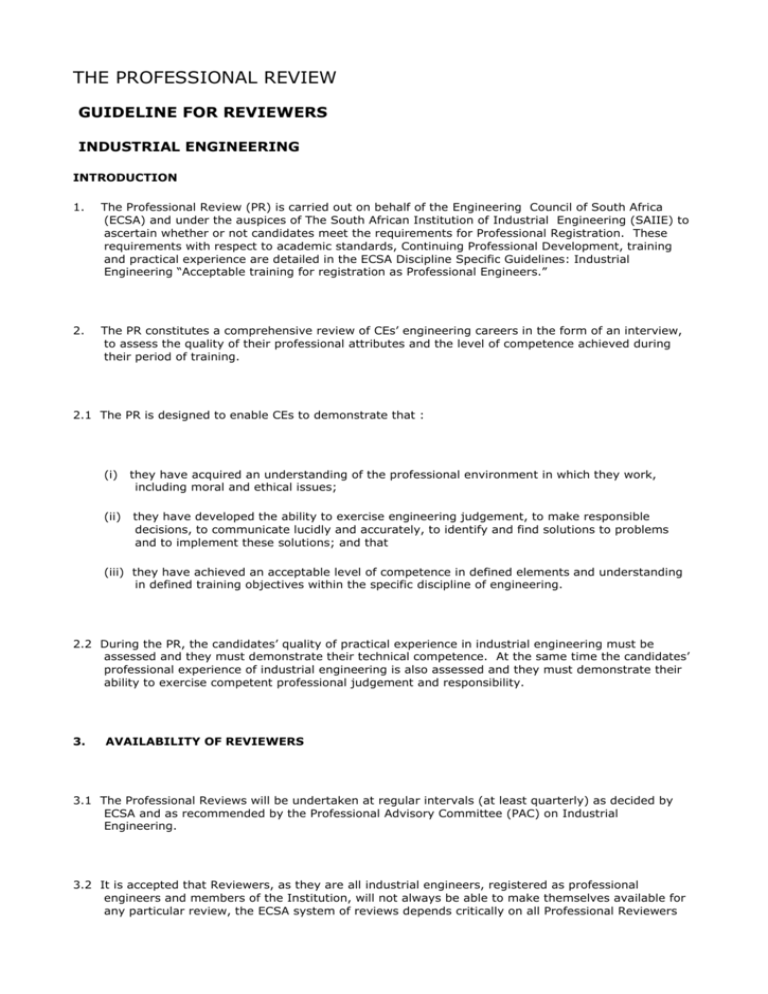
THE PROFESSIONAL REVIEW GUIDELINE FOR REVIEWERS INDUSTRIAL ENGINEERING INTRODUCTION 1. The Professional Review (PR) is carried out on behalf of the Engineering Council of South Africa (ECSA) and under the auspices of The South African Institution of Industrial Engineering (SAIIE) to ascertain whether or not candidates meet the requirements for Professional Registration. These requirements with respect to academic standards, Continuing Professional Development, training and practical experience are detailed in the ECSA Discipline Specific Guidelines: Industrial Engineering “Acceptable training for registration as Professional Engineers.” 2. The PR constitutes a comprehensive review of CEs’ engineering careers in the form of an interview, to assess the quality of their professional attributes and the level of competence achieved during their period of training. 2.1 The PR is designed to enable CEs to demonstrate that : (i) they have acquired an understanding of the professional environment in which they work, including moral and ethical issues; (ii) they have developed the ability to exercise engineering judgement, to make responsible decisions, to communicate lucidly and accurately, to identify and find solutions to problems and to implement these solutions; and that (iii) they have achieved an acceptable level of competence in defined elements and understanding in defined training objectives within the specific discipline of engineering. 2.2 During the PR, the candidates’ quality of practical experience in industrial engineering must be assessed and they must demonstrate their technical competence. At the same time the candidates’ professional experience of industrial engineering is also assessed and they must demonstrate their ability to exercise competent professional judgement and responsibility. 3. AVAILABILITY OF REVIEWERS 3.1 The Professional Reviews will be undertaken at regular intervals (at least quarterly) as decided by ECSA and as recommended by the Professional Advisory Committee (PAC) on Industrial Engineering. 3.2 It is accepted that Reviewers, as they are all industrial engineers, registered as professional engineers and members of the Institution, will not always be able to make themselves available for any particular review, the ECSA system of reviews depends critically on all Professional Reviewers honouring their commitments; it is therefore expected that Reviewers will only withdraw in a real emergency. 4. VENUE The SAIIE’s administrative staff, in consultation with the Reviewers and ECSA’s Registration Department, is responsible to make arrangements for finding and booking venue accommodation in which the reviews are to take place. It is quite acceptable for the interview to take place in the office of one of the Reviewers, provided such interviews are conducted in the correct environment. 5. PRELIMINARY ACTIVITIES The academic qualifications of candidates and the extent of their experience will have been checked by the ECSA’s Education and Registration Department prior to the Experience Appraisal (EA) by the Professional Advisory Committee (PAC) on Industrial Engineering. The PAC does the EA (a thorough appraisal of a candidate’s experience on account of the documentation and reports submitted, the so- called “paper exercise”) in respect of candidates who have not trained under a Commitment and Undertaking (CU) and decides if a candidate is fit to attend the interview. The interview is arranged after the result of the EA has been made known to the ECSA Registration Department by the PAC on Industrial Engineering. 6. SUBMISSION OF DOCUMENTS TO REVIEWERS Copies of the reports and other relevant documents on training and experience, will be sent to the Reviewers by ECSA’s Registration Department after the review panel has been established by the SAIIE. As far as is possible both candidates and Reviewers will be informed of the details of timing and venues of professional reviews 28 days prior to the interview dates. 7. CONFLICT OF PROFESSIONAL INTEREST Every effort must be made to ensure that there is no conflict of professional interest e.g. a Reviewer being from the same office or firm as the candidate. If either the Reviewer of the candidate notices such a conflict, the Reviewer will be changed. Reviewers themselves are expected to declare any noticed conflict of interest as soon as they are notified of their candidates. 8. REVIEW OF APPLICATION In the case of candidates who have fully trained under a Commitment and Undertaking (CU), the Reviewers will study the candidate’s application, including the quality of the experience which the candidate claims to have gained in the different fields of employment within the Industrial engineering discipline. Should they all be of the same opinion then they should inform the PAC, IN TERMS THAT CAN BE QUOTED TO THE CANDIDATE, why the candidate fails to meet the requirements of ECSA and recommend how these shortcomings may be overcome. 9. THE REVIEW 9.1 At the Review, candidates are examined by a panel of two professional engineers; one of the two will be appointed as the “Convenor” and be in overall charge. For one morning’s review session, each Reviewing partnership will receive a list of up to two (on rare occasions three) candidates timed at half-hourly intervals. At the Review, the candidates’ professional experience and responsibilities in their various appointments should be reviewed against the criteria laid down in the ECSA Discipline Specific Guidelines for Industrial Engineering and Policy Statement R2/1A in order to form an opinion as to their professional competencies. The decision being taken by the panel is, in essence, whether the candidates discharge their duties in a manner commensurate with Professional Industrial Engineers and demonstrate professional competence. 9.2 The following points affecting the review should be taken into account: · Reviews should not be longer than an hour. · The review is conducted on the basis of the account of experiential training given by the application in the application. · The reviewers should determine whether the candidate has achieved three years of responsible post graduate experience as set out in the Discipline Specific Guidelines for Industrial Engineering and ECSA Policy Statement R2/1A. · The reviewers should ascertain the extent to which the candidate has benefited by his/her practical experience and his/her absorption of the various aspects of industrial engineering in which he/she has received during training. · The reviewers must satisfy themselves that the candidate has attained a sufficient standard of technical competence to justify registration. · The reviewers should satisfy themselves that the candidate is aware of, amongst all other things, the practical aspects of safety in the engineering environment he/she works in. 10. ASSESSMENT The Reviewers should decide after the interview in which of the following categories they consider the candidate should be placed: (a) Satisfactory in every respect and one who meets the requirement for registration. (b) Not quite up to standard of (a) but one who should be recommended for registration if he/she submits additional reports in areas where deficiencies were detected. (c) Insufficiently experienced justifying a recommendation for as not yet meeting the requirements for registration. On conclusion of the Interview, the Reviewers will reach an agreement as to their recommendation to the PAC on Industrial Engineering and, attach the Review Report Form giving the details of the reasons underlying their recommendation. In cases where the panel finds that a candidate is not registerable, advice written as a summary of those reasons, must be added to the Form of Assessment, IN TERMS WHICH CAN BE QUOTED TO THE CANDIDATE. 11. All results must be returned to the ECSA Registration Department within 21 days of the date of the review. The ECSA Registration Department will upon receipt of the results present it to the PAC on Industrial Engineering for a final decision.
